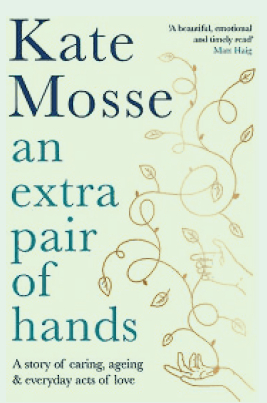Serviços Personalizados
Artigo
Indicadores
Links relacionados
-
 Citado por Google
Citado por Google -
 Similares em Google
Similares em Google
Compartilhar
South African Journal of Occupational Therapy
versão On-line ISSN 2310-3833
versão impressa ISSN 0038-2337
S. Afr. j. occup. ther. vol.52 no.3 Pretoria Dez. 2022
http://dx.doi.org/10.17159/2310-3833/2022/vol52n3a12
BOOK REVIEW
An Extra Pair of Hands. A Story of Caring, Aging and Everyday Acts of Love by Kate Mosse
Elzette Pelser
Rita Henn & Partners, Netcare Rehabilitation Hospital, Auckland Park, Johannesburg, South Africa Email: elzette@jaleroux.com. http://orcid.org/0000-0003-1319-0184

TITLE: An Extra Pair of Hands. A Story of Caring, Aging and Everyday Acts of Love
AUTHOR: Kate Mosse
Publish by: Profile Books, London
Date of publication: June 2021
ISBN number: 978 1 78816 261 6
Available in: Hardcopy - ZAR355; E-Book -ZAR140
Number of pages: 193 pages
Declaration of bias: The reviewer has no biases to declare. She has no affiliation with the author or publisher.
Declaration of bias: The reviewer has no affiliation with the authors, publisher or any of the organisations mentioned in the review.
Information on the author
Kate Mosse is an internationally bestselling novelist, playwright, and non-fiction author with sales of more than eight million copies in 38 languages. Renowned for bringing unheard and under-heard histories to life, she is a champion of women's creativity. Kate is the Founder Director of the Women's Prize for Fiction, the Founder of the global 'Woman in History' campaign and a Visiting Professor of Contemporary Fiction and Creative Writing at the University of Chichester. Kate lives in West Sussex with her husband and mother-in-law.
The Review
In this book, Kate Mosse shares her personal story of finding herself as a caregiver in middle age: first, helping her mother look after her father who was suffering from Parkinson's, followed by supporting her mother in widowhood, and finally as "an extra pair of hands" for her 90-year-old mother-in-law who stays with them.
Kate states that all too often, old age is presented as a problem to be solved, when it should be a cause for celebration that many women and men are living enjoyable, contented, valued and beloved lives well into their eighties and nineties. However, the consequences of people living to this age, are firstly, the issue of quality of life and living well with dignity, secondly, who does the caring, and thirdly when caring for someone whose mental functions are impaired, such as from dementia or Alzheimer's, the care burden is exponentially more demanding.
Kate elaborates on the demands of being a caregiver. She had paid caregivers in to help with more intimate and physically demanding aspects of getting her loved one up in the morning and going to bed at night and still felt the demands of care giving. She explains the routine, endless repetition of things such as conversations, medication, meals, laundry, personal hygiene. It is about always having someone else's needs at the forefront of your mind, and about having a parallel life running alongside your own, about thinking for two (or more) instead of one. How food and eating can be a battlefield. The constant dialogue about it, the struggle to summon up interest in food and loss of appetites. How caregivers worry that the person they're caring for is eating too little or too little of the 'right' thing. The indignity of no longer being able to feed oneself. Kate suggests that learning to be tolerant and patient around the person being cared for is not only a requirement, but an act of kindness. Any impatience a caregiver might feel is tenfold worse for the person who, possibly against the characteristics of a lifetime, is having to ask for help with menial tasks.
Many caregivers that Kate spoke to when she was writing the book, admitted how they had often wished that the constant low-level pressure of caring would go away. How they felt guilty about feeling impatient, not compassionate, at yet another call for help. Guilty about the misunderstandings, how they felt bad at not wanting to be in a sickroom that smelt of defeat, doing all those unpleasant and intimate tasks that must be done over and again. Caregivers also report that they feel lonely or socially isolated and suffered with their own mental and physical health. Often caregivers are elderly themselves. Kate stresses the importance that caregivers be kind to themselves too, and how they should accept that sometimes they feel snappy or ill, resentful, and become frustrated. Kate points out that coping with and preparing for grief (once the person cared for has passed on) is a key part of being a caregiver. After the initial sense of freedom from living one's daily life to another person's rhythm, it is not uncommon for caregivers to feel purposeless.
Giving insight into the experiences and realities of caregiving this book is recommended reading for occupational therapists. A reminder that the only thing caregiver can do is to take one day at a time. Enjoy the good days, muddle through the bad days, and never take anything for granted. An Extra Pair of Hands is an easy-read-story of Kate's journey of caring for her 3 older adult loved ones. Occupational therapists often work with both caregivers and those that need caring and in rehabilitation caregivers are often part of the team. The insights from this book will be of value.














